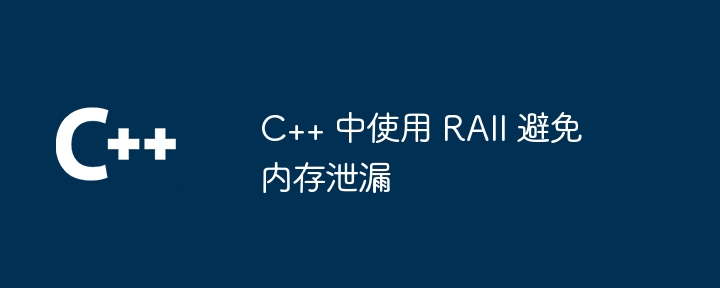

Using RAII in C to avoid memory leaks
What is RAII?
RAII (Resource Acquisition Is Initialization) is a C programming paradigm used to ensure that resources are automatically released when an object goes out of scope or is destroyed.
Why use RAII?
In C, manually managing memory allocation and deallocation can lead to memory leaks, where the program fails to properly free a block of memory when it is no longer needed. RAII helps avoid this situation because it automatically releases resources when the object is destroyed.
Implementation of RAII
RAII can be implemented by defining a destructor that is responsible for releasing resources when the object goes out of scope. For example:
class MyClass {
public:
MyClass() {
// 分配资源
}
~MyClass() {
// 释放资源
}
};Practical case
Let’s look at a practical example of using RAII to prevent memory leaks. Consider the following code:
int* ptr = new int; // 分配内存 // ... 使用 ptr ... delete ptr; // 释放内存
If an exception occurs accidentally, ptr may point to unreleased memory, causing a memory leak.
Using RAII, we can rewrite it as follows:
{
unique_ptr<int> ptr = make_unique<int>(); // 使用 RAII
// ... 使用 ptr ...
} // 超出范围时自动释放 ptrunique_ptr is a smart pointer provided in the C standard library, which implements RAII and ensures that The memory pointed to by the pointer is automatically released when the object goes out of scope.
Summary
By using RAII, we can avoid manually managing memory leaks and write more robust and reliable C programs.
The above is the detailed content of Using RAII in C++ to avoid memory leaks. For more information, please follow other related articles on the PHP Chinese website!
 What are the differences between c++ and c language
What are the differences between c++ and c language
 Recommended learning order for c++ and python
Recommended learning order for c++ and python
 Cost-effectiveness analysis of learning python and c++
Cost-effectiveness analysis of learning python and c++
 Is c language the same as c++?
Is c language the same as c++?
 Which is better to learn first, c language or c++?
Which is better to learn first, c language or c++?
 The difference and connection between c language and c++
The difference and connection between c language and c++
 C++ software Chinese change tutorial
C++ software Chinese change tutorial
 Cost-effectiveness analysis of learning python, java and c++
Cost-effectiveness analysis of learning python, java and c++




